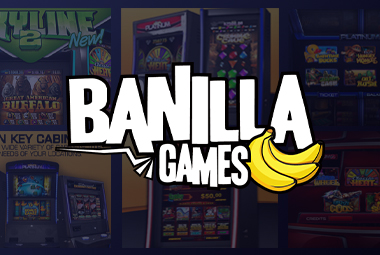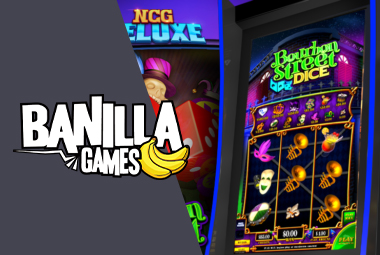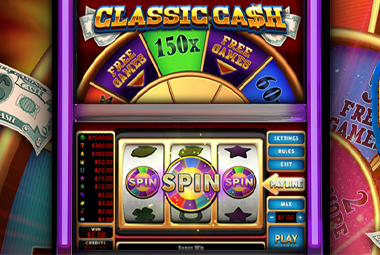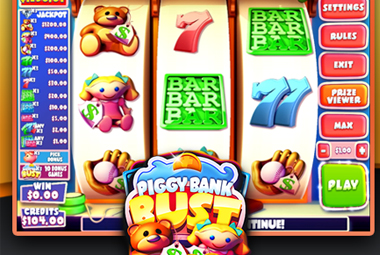INTRODUCTION

I recently had the opportunity to talk to a few representatives of Banilla Games concerning their products in the Pennsylvania market. I was actually a bit surprised by the phone call, so didn’t have the ability to record set up, but the gentlemen informed me that they didn’t mind being paraphrased a bit as long as it was kept accurate.
The result is that I’m now able to offer some more information about them, their products in Pennsylvania and how they relate to the company Pace-O-Matic.
Before we get into that, I do want to see that these were some cool guys and serious straight shooters. You’ll find throughout this article (I did write down a couple of direct quotes) that they’re the type to tell it as they see it--often with colorful language!
BANILLA GAMES V. PACE-O-MATIC
“They think they’re our competition--they’re not.”
Banilla Games basically sees itself as a totally different company than Pace-O-Matic that just has somewhat similar products. As we will detail below, the way that these products relate to the distributors and, ultimately, the operators is entirely different.
Briefly, Pace-O-Matic operates with the distributors and physical locations on a revenue-sharing basis. Players play the machines which (theoretically) generates a fixed amount of profits of which each entity gets a cut. The Pace-O-Matic games also operate on a fixed pool of spins by which, if the pool runs out, the operator has to ask the distributor (who then asks Pace-O-Matic) to reseed the spin pool.
Banilla Games manufactures software that runs the games and manufactures the physical cabinets and sells them. That’s it.
For that reason, Banilla Games has a degree of separation from any legal threat-real or imagined, “We’re not going to get fined. We’re not going to have our bank accounts frozen. Nobody from Banilla Games is going to go to jail. We sell machines. That’s what we do. We don’t control what happens to them after that.”
Of course, some of these machines--The Keystone Series being the one I know by name--do have the, “Prize Viewer,” feature by which a player can know ahead of time whether a spin is going to win or lose. Based on the machines I have uncovered in Pennsylvania so far, the majority of Banilla Games don’t have this feature.
I asked the representatives about whether or not that feature (which effectively means that a player who is aware of it can do nothing but win if he wants to---by simply not playing losing results) can possibly make a difference whether it is a skill game or a gambling game.
No. We don’t think so. Do you think if an operator gets taken to court over these machines that they’re going to be able to point to one feature and that’s going to decide whether it’s a game of skill or not?
Also, we’re not like Pace-O-Matic. Pace-O-Matic runs around advertising that all of their machines are legal--nobody gives a shit. We’re not going to run around calling our machines legal when they haven’t been regulated---except in Georgia, where they are.
Brandon James: That may be so, but couldn’t you argue that the look ahead feature on either manufacturer can make it not even gambling at all? If a player doesn’t want to lose, then he doesn’t have to lose. A player can choose to do nothing but win. Don’t you think that benefits the argument?
I guess it could, but it doesn’t matter to us. We just sell the machines and the distributors can put them wherever they want to put them. They buy the machines and they decide whether they think the machines are allowed to be there. The operators decide whether they think the machines are allowed to be there. None of that matters to us. We just sell machines to whoever wants them.
Effectively, while the distributors might make claims (especially on the signage) that the machines are specifically legal skill games in the State of Pennsylvania, Banilla Games itself makes no such claim. I did express concern with the machines that do NOT have the Prize Viewer feature that have signage that a look-ahead type feature exists.
Brandon James: The operators are calling them legal and so are the distributors. It might not be your signage, but there’s a sticker right on the cabinets that says they are legal skill games in the State of Pennsylvania, and---
We didn’t put that sticker there. They can put whatever they want on them. We’re not claiming that the machines are legal.
Brandon James: Right. I get that. But, the signage also speaks to the effect that the player can know whether the result is a win or loss ahead of time, even on the units that don’t have that functionality.
Well, that’s stupid. We’re not the ones who put the signage there. The distributors can put whatever signage they want, but they probably shouldn’t be saying a machine has a feature that it doesn’t. We don’t control that, though. Once we sell a machine, that’s it, we never have anything to do with it again.
Brandon James: What about refilling the spin pool? Do they operate on EPROM chips with a random number generator?
There’s no spin pool to refill because we have nothing to do with the operators. The machines will continue to play forever once you’ve bought them. You don’t need to do anything.
Brandon James: Are they random then? Is there a pool of spins that repeats itself, or does it randomly generate a result by RNG exactly like a slot machine would?
There’s a fixed pool of spins that repeats itself. It doesn’t, “Reseed,” anything because it will just go on forever. The only reason Pace-O-Matics do that is so that they can sell more spins to the operator when the spins run out. Our machines are designed so that they’ll play forever.
Brandon James: I wouldn’t say that’s the only reason. The operator can also access the remaining cash amount of the spins that are left as well as the remaining prizes for a particular set of spins.
Yeah, but that’s also for the same reason. It’s because you have to buy a fill from Pace-O-Matic when the spins run out. Our machines don’t need refilled and will play forever. It does what it does, but the only reason Pace-O-Matic has that is because they do things on a revenue-sharing basis. We don’t. We sell machines and that’s it.

Brandon James: What’s the revenue split between Banilla Games distributors and the locations the machines are in?
That has nothing to do with us. It’s none of our business.
Brandon James: Okay, so you mentioned Georgia as being regulated for skill games. How do the Banilla Games work in Georgia? Is Pace-O-Matic also in Georgia?
The last thing Pace-O-Matic would ever want is for the skill games to be regulated. There are some 25,000 game of skill machines in Georgia, 9,000 of them are manufactured by Banilla Games. Pace-O-Matic has about 200 in the State of Georgia.
Listen, they do a great job doing what they do, but they do something entirely different. Their whole thing is revenue-sharing and going from state-to-state trying to claim that their machines are legal. They do a great job, I won’t take anything away from them, but they’re not our competition. If you want to play a machine, our machines are much better.
Brandon James: You guys have near misses. On Pace-O-Matic, you won’t even get two of the same symbol on a spin unless it’s a spin that can be won. On the, “Hot Pick,” games, you’ll spin and it’ll be Free Games, Free Games, then once the Hot Pick is revealed---nobody home. Slots call that a near miss. Is it fair to say that your machines are closer to being a slot machine than Pace-O-Matic?
Our machines are Games of Skill. We sell machines. We don’t get into legalities because we don’t operate machines. The only thing I can say is that every Banilla Games machine in Georgia is a legal game of skill under Georgia law.
Brandon James: I guess that’s not the right question. I mean, you have near misses. You have the ones where the player does not even get to make a choice if it’s going to be a losing spin no matter what the player does. Not all of them have the Prize Reveal, or equivalent. Would you say it’s fair to characterize them as being more like a slot machine in terms of features than a Pace-O-Matic?
Yeah, our machines are awesome. They have great graphics and features and are more similar to a slot machine in that way. That’s what players want. They’re just more fun to play.
Brandon James: If someone is going to just sit down and play one that doesn’t have the look-ahead feature, so you can’t know if you’re going to win or not, would you call that gambling?
Again, we don’t make any distinction of what is a game of skill or what is gambling in other states because we don’t distribute those machines. It’s for the distributor or the courts to decide, whatever the case. In the State of Georgia, our games are Games of Skill. Other than that, we don’t make any legal claims.
Brandon James: What about Virginia? I know there are a bunch of skill games there, what’s the market share look like?
They’re phasing them out in Virginia. The distributors are not putting any new products in Virginia and operators are not allowed to have new ones. They can have the ones they’ve already had until sometime next year, but that’s it. Also, that all has to do with the distributors.
Anyway, we don’t really have the numbers because that’s through the distributors. A lot of machines that you’re seeing in Pennsylvania (meaning physical cabinets) probably came from Virginia.
Brandon James: Where else would they have come from?
You probably have some that were in Georgia and some that came from Wisconsin. Other than that, we wouldn’t know. The distributors can put them wherever they want to put them.
Brandon James: What about the games made specifically for Pennsylvania?
The manufacturing of our games is not regulated. We don’t make games for specific jurisdictions.
Brandon James: Well, they have the, “Prize Viewer,” feature and are called, “Keystone Series,” Pennsylvania is The Keystone State, so I’m reading between the lines on this one.
(Chuckles) Yeah, but we don’t call them that. That’s what the distributor calls them. Actually, we designed those machines the way we did at the request of the distributor. The distributor can call a machine whatever it wants to. It was a specific distributor that requested that type of machine.

Brandon James: What about the machines where you don’t have the illusion of choice on a losing result? The ones where you don’t even get to make a choice if any possible choice could only lose? Are those specific machine types, or is that just a function that can be toggled on and off?
It usually depends on the specific type of machine. We have a few where the operator can decide whether to have it on or off.
Brandon James: And, the ones with the banana feature? What’s the return on those if someone plays the skill game with 100% accuracy?
The player would win 104% of whatever the player bet.
Brandon James: I know with the Pace-O-Matics it’s 105% that you could win forever by cheating. It just wouldn’t be worth very much, six bucks an hour or something. What if a distributor were to ask---hey, what happens if someone decides to just cheat on these forever?
What is cheating? You can’t cheat.
Brandon James: The Pace-O-Matic has the game like Simon Says, but what if I take the nine colors and just make the 3x3 grid like a telephone keypad? I just sit there with a notebook and write down the spots that I have to press and win every time.
Why would that be cheating? That’s not cheating. Did someone tell you you’re not allowed to do that?
Brandon James: If you ever leave your current job, you’d probably be a great advantage player.
I just wouldn’t make up rules. It’s not cheating if nobody says you can’t do it.
Brandon James: Well, you can bet up to $20.00 on your machines, so if someone thought it was worth the time, they can sit there and win $0.80 per play guaranteed. I don’t know how fast it is. I haven’t tried to not cheat on your games yet.
I don’t know and we also don’t care because we don’t do revenue-sharing. If it becomes a problem for someone, the maximum play amount is customizable. They can set the play amounts to whatever they want within the range.
Brandon James: That’s another question. Generally speaking, just give me low end and high end...your machines run from a minimum of $0.10 per play to $20.00 per play, so what would the return range be for a max bet or for a minimum bet?
We don’t have any games that are ten cents a play.
Brandon James: I guess I have a third manufacturer to write about. Okay, so from $0.25-$20.00 what would be the return-to-player range?
There’s no one range or anything like that. It’s also customizable by the operator and can depend on the machine and the game. Usually, the range is going to be something like ninety percent to ninety-eight percent (90-98%) and can depend on a lot of things, but the biggest thing is the bet amount.
There are lower settings than that the operator can choose to do, but I can say that they aren’t much lower than that.
Brandon James: Well, you sell the machines to the distributor and that’s it. How much do your machines range in cost?
Low end is about $5,000 all the way up to $9,000 or $10,000. I’ll tell you this: Pace-O-Matic makes A LOT more per machine than we do because of the revenue sharing. We just sell the machines to the distributors, so they put them where they think a lot of people will play. We don’t see any extra money regardless of who plays and we don’t know where they go.
With the different machine titles, I’d know probably about how old they are and can guess where they came from. The Diamond 3 machine you mentioned is about five years old. We don’t even sell those new anymore.
But, Pace-O-Matic gets a cut as long as those machines are there. With our machines, it’s just the location and the distributor splitting the money and you never have to buy another set of spins...they’ll go forever.
Brandon James: My sample size is pretty limited, but it seems there are more Banilla Games machines than Pace-O-Matics in the places I’ve looked. Do you know what the machine counts are in Pennsylvania?
I know that Pace-O-Matic probably has a lot more machines in Pennsylvania than you’ll find Banilla machines, but maybe it’s different where you are. We don’t keep an exact count because they are wherever the distributors want to put them. It might be different in your city, but Pace-O-Matic moves from state to state and operates on revenue sharing unless it’s decided that the games aren’t legal there.
Until then, they advertise the machines as being legal games of skill. It’s not even true.
Brandon James: The Beaver County decision basically makes it ambiguous. They’re not legal or regulated, but the injunction was lifted simply because there was found no law that would make them illegal. I don’t know how much the look-aheads feature comes into play in that decision.
It probably doesn’t. Pace-O-Matic actually advertises itself as legal games of skill and they aren’t. They might not be illegal, but it’s not like they’re regulated.
The last thing that Pace-O-Matic would ever want is for a state to regulate the games. Our machines are just better than theirs. Pace-O-Matic is really good at what they do, but our games are more fun and have better features and graphics.
Even if they got regulated, do you think the look-ahead feature would be the end all and be all? I doubt it. Besides, Pace-O-Matic would have to start sharing revenues with the state.
Brandon James: I wouldn’t think any of you guys would want the machines regulated. If they were going to do that, then they could just have video lottery parlors like West Virginia. That wouldn’t be good for either of your companies, unless you switched and started manufacturing those kinds of games.
Why wouldn’t it be good?
Brandon James: Well, look at West Virginia. You can have a place with 5-7 video lottery terminals that are regulated by the state. If there’s a Pace-O-Matic or Banilla Games machine in the entire state, I’ve certainly never seen it. Why would any location even want those when they could just have commercial VLT’s?
It wouldn’t matter to us from an operating standpoint, but we might sell fewer machines to distributors if every state had VLT parlors, that’s true.
Brandon James: What do you mean when you say that Pace-O-Matic is not your competition?
Because we just sell our machines to the distributors. Pace-O-Matic sits around and talks about Banilla Games in meetings every single day, but the only time we ever talk about them is if they are moving into a new state or something. Pace-O-Matic also does the revenue sharing, so they have to worry about us because of that.
If they just sold machines to distributors they would be our competition, but it’s an entirely different business model.
Brandon James: They probably see you guys as competition because there’s only so many potential places for games of skill to go.
That’s true, but that’s on the end of the distributors who buy our machines. They compete with Pace-O-Matic to get their machines into locations in certain markets, but what Pace-O-Matic is doing mostly doesn’t matter to us.
(After some well wishes as the gentlemen had a meeting to get to)
Brandon James: I want to thank you guys for the time and information. I’m basically on your side on the whole thing. I think companies should be allowed to put any kind of machine they want wherever the hell they want to and operators operate them if they want to. Players can play them if they want, or if they don’t trust them, not play them.

That’s the way we feel about it. Thank you for your time and feedback also. It’s been a pleasure talking to you.
CONCLUSION
If we’re going to make a distinction between, “Games of Skill,” and, “Slot machines,” my opinion that the machines with look-ahead features are closer to being skill games is unchanged, but we learned that Banilla Games doesn’t believe it’s a defining characteristic of whether or not something is a game of skill.
We’ve also learned that Banilla Games operates in a totally different way than Pace-O-Matic in that they just sell the machines to the distributors, then it’s for the distributors to get them out to individual locations and deal with whatever legal consequences may or may not come. Banilla Games is very clear that, unlike Pace-O-Matic, everything having to do with their machines is out of their hands once the machines leave the warehouse.
We already knew that Pace-O-Matic does revenue sharing with the operators, but prior to this conversation, had no reason to suspect that it’s not the same for Banilla Games. We also know that Banilla Games machines have a finite spin pool that just continues to recycle itself after it has been played through. With the Pace-O-Matic machines, a particular game/bet would have to be reseeded if it ran out of spins.
Also, if two machines had the same return-to-player and the distributor was taking the same cut, operators would actually arguably be better off with Banilla Games machines. The specific percentages and profits are going to vary as the agreement between distributors and operators might vary, but Banilla Games is not getting any part of the revenues from the players.
Comments
I do want to disclaim that on a scale of 1-10 with 1 being verbatim and 10 being heavily paraphrased---this article is about a 4...but a few things in there are verbatim quotes. The reason for that is because the phone call caught me by surprise, (was not scheduled ahead) but the Banilla Games representatives called basically ready to talk for a half hour before a meeting they had to get to. I asked variations of the same question on a few occasions just because I wanted to get the answers as close as possible to exact quotes. In any case, I wasn't in a position to easily set up recording.



